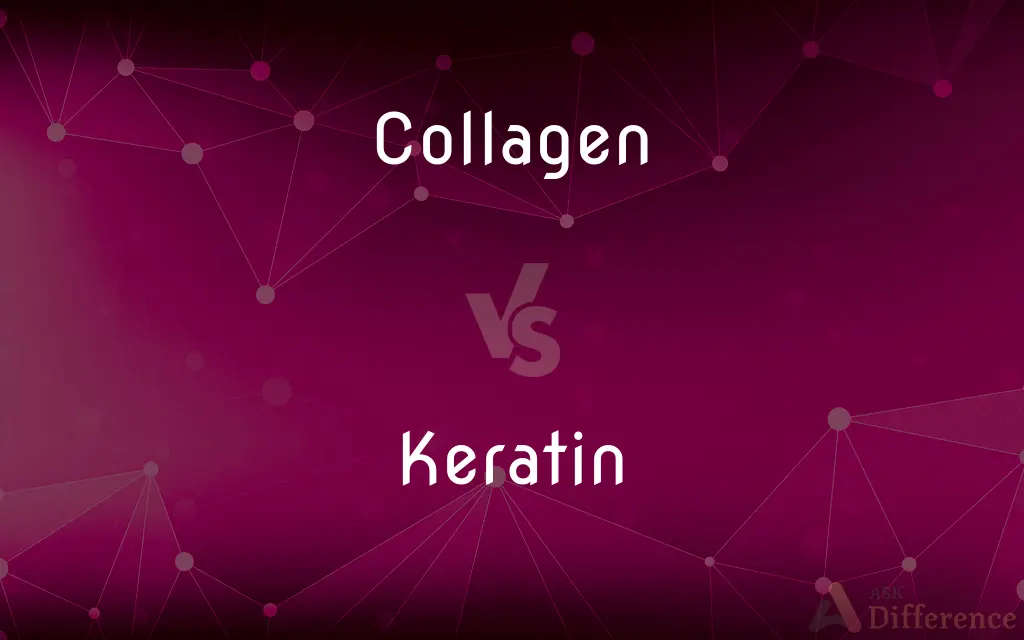Collagen vs. Keratin — What's the Difference?
Edited by Tayyaba Rehman — By Fiza Rafique — Updated on September 30, 2023
Collagen is a protein that provides structure to skin, tendons, and bones. Keratin is a protein found in hair, nails, and the outer skin layer, known for its protective qualities. Both are vital proteins in the body but serve different functions.

Difference Between Collagen and Keratin
Table of Contents
ADVERTISEMENT
Key Differences
Collagen and Keratin, both being proteins, have distinct roles and appearances in our body. Collagen primarily acts as a supporting structure, giving elasticity and strength to our skin, joints, and bones. On the flip side, Keratin predominantly forms the structural component of hair, nails, and the outermost layer of the skin.
Within the layers of our skin, Collagen ensures firmness and suppleness, playing a pivotal role in skin health. Its decline with age often leads to wrinkles. Keratin, however, is tasked with a protective function. Being a tough and insoluble protein, it safeguards the hair and nails from external damages, and its presence in the epidermis serves as a protective shield against environmental harms.
When we discuss treatments or products, those rich in Collagen often aim at rejuvenating skin health or alleviating joint pain. They promise enhanced skin hydration and reduced signs of aging. In contrast, Keratin treatments, especially for hair, focus on strength, protection, and smoothness, offering a shiny, frizz-free appearance.
In dietary or supplement contexts, Collagen is often sourced from animal connective tissues and is advocated for skin, joint, and bone health. Keratin supplements or products, however, are marketed to enhance the health and appearance of hair and nails.
Comparison Chart
Primary Function
Provides structure to skin, tendons, bones.
Forms the main component of hair, nails, outer skin.
ADVERTISEMENT
Presence
Found in skin, bones, tendons, ligaments.
Found in hair, nails, epidermis of skin.
Role in Skin
Provides elasticity and hydration.
Offers protection and surface strength.
Common Treatments
Skin rejuvenation, joint supplements.
Hair smoothing, nail strengthening.
Reaction to Age
Decreases, leading to wrinkles.
Can weaken, leading to brittle hair/nails.
Compare with Definitions
Collagen
The primary structural component found in tendons and ligaments.
Collagen ensures the flexibility of our joints.
Keratin
A protective protein primarily found in hair and nails.
Keratin treatments make hair smooth and shiny.
Collagen
A protein responsible for skin elasticity and firmness.
Collagen supplements can enhance skin hydration.
Keratin
Often utilized in hair treatments for a frizz-free appearance.
She opts for a Keratin treatment to manage her curly hair.
Collagen
Commonly used in skincare to combat signs of aging.
Her skincare routine includes a Collagen-infused serum.
Keratin
An insoluble protein that offers strength and resilience.
Keratin makes our nails tough and resistant.
Collagen
A vital protein for maintaining bone strength.
Aging leads to decreased Collagen in bones.
Keratin
Keratin () is one of a family of fibrous structural proteins known as scleroproteins. α-Keratin is a type of keratin found in vertebrates.
Collagen
A gelatinous substance derived from animal connective tissues.
Collagen gels are popular in cosmetic treatments.
Keratin
A fibrous protein forming the main structural constituent of hair, feathers, hoofs, claws, horns, etc.
Collagen
Collagen () is the main structural protein in the extracellular matrix found in the body's various connective tissues. As the main component of connective tissue, it is the most abundant protein in mammals, making up from 25% to 35% of the whole-body protein content.
Keratin
Any of a class of filamentous proteins that are abundant in the cytoskeleton of vertebrate epithelial cells and are the main constituents of the outer layer of skin and tough epidermal structures such as hair, nails, hooves, feathers, and claws.
Collagen
The main structural protein found in skin and other connective tissues, widely used in purified form for cosmetic surgical treatments
She was given a collagen injection to smooth out wrinkles in her forehead
Vitamin C plays a vital role in the formation of collagen
Keratin
Material composed principally of keratin proteins.
Collagen
Any of a class of extracellular proteins that are composed of three coiled polypeptide chains, form strong fibers, and are the main constituents of cartilage, bone, and other connective tissues in animals.
Keratin
(protein) The protein of which hair and nails are composed.
Collagen
Material composed principally of collagen proteins. Collagen is converted into gelatin when boiled in water.
Keratin
A sulfur-containing fibrous protein constituting the main structural protein of hard epidermal tissues, such as horn, hair, feathers, nails, claws, hoofs, and the like. It is an insoluble substance, and, unlike elastin, is not dissolved even by gastric or pancreatic juice. By decomposition with sulphuric acid it yields leucine and tyrosine plus various other acid-stable amino acids. The amino acid composition varies, but it usually has a high percentage of cystine, which stabilizes and insolubilizes the protein by forming intrachain linkages. A softer form of keratin is present in the epidermis and whalebone. Called also epidermose.
Collagen
(biochemistry) Any of more than 28 types of glycoprotein that form elongated fibers, usually found in the extracellular matrix of connective tissue.
Keratin
A fibrous scleroprotein that occurs in the outer layer of the skin and in horny tissues such as hair feathers nails and hooves
Collagen
The chemical basis of ordinary connective tissue, as of tendons or sinews and of bone. On being boiled in water it becomes gelatin or glue.
Keratin
Present in the outermost layer of skin for protection.
The epidermis has Keratin to shield against external factors.
Collagen
A fibrous scleroprotein in bone and cartilage and tendon and other connective tissue; yields gelatin on boiling
Keratin
A fibrous protein that provides structure to epithelial cells.
Keratin ensures the rigidity of the skin's outer layer.
Common Curiosities
Are there vegan sources of Collagen?
Traditionally, Collagen is animal-derived, but there are now vegan alternatives made from genetically modified yeast and bacteria.
Can Keratin treatments straighten curly hair?
Yes, Keratin treatments can smooth and straighten curly hair, reducing frizz.
Can Keratin products repair damaged hair?
Keratin products can strengthen and restore the hair's protective layer, improving its appearance.
Is it safe to take Collagen supplements daily?
Generally, Collagen supplements are considered safe, but it's always best to consult a healthcare provider.
Can both Collagen and Keratin be found in skin?
Yes, Collagen provides structure and elasticity, while Keratin offers protection in the skin's outer layer.
Are there different types of Collagen?
Yes, there are multiple types of Collagen, with Type I, II, and III being the most common in the body.
How often should one get Keratin treatments?
Depending on hair type and desired results, treatments are typically done every few months.
Are there side effects to Keratin hair treatments?
Some people might experience skin irritation or allergies, and some treatments may contain formaldehyde, a known carcinogen.
Does our body produce both Collagen and Keratin naturally?
Yes, the body naturally produces both, but production can decrease with age.
Do Keratin shampoos help with hair breakage?
Keratin-infused shampoos can strengthen hair and reduce breakage, but results may vary.
Does sun exposure affect Keratin in the skin?
Prolonged sun exposure can weaken Keratin in the skin, leading to damage.
Can Collagen help with joint pain?
Some studies suggest Collagen supplements can alleviate joint pain, but more research is needed.
What happens to Collagen as we age?
Collagen production decreases with age, leading to wrinkles and reduced skin elasticity.
Can Collagen improve hair health?
While Collagen's primary benefits are for skin and joints, some believe it can also improve hair health.
Are there foods that boost Keratin production?
Foods rich in protein, biotin, and antioxidants can support Keratin production.
Share Your Discovery

Previous Comparison
Render vs. Tender
Next Comparison
Choice vs. AlternativeAuthor Spotlight
Written by
Fiza RafiqueFiza Rafique is a skilled content writer at AskDifference.com, where she meticulously refines and enhances written pieces. Drawing from her vast editorial expertise, Fiza ensures clarity, accuracy, and precision in every article. Passionate about language, she continually seeks to elevate the quality of content for readers worldwide.
Edited by
Tayyaba RehmanTayyaba Rehman is a distinguished writer, currently serving as a primary contributor to askdifference.com. As a researcher in semantics and etymology, Tayyaba's passion for the complexity of languages and their distinctions has found a perfect home on the platform. Tayyaba delves into the intricacies of language, distinguishing between commonly confused words and phrases, thereby providing clarity for readers worldwide.
















































